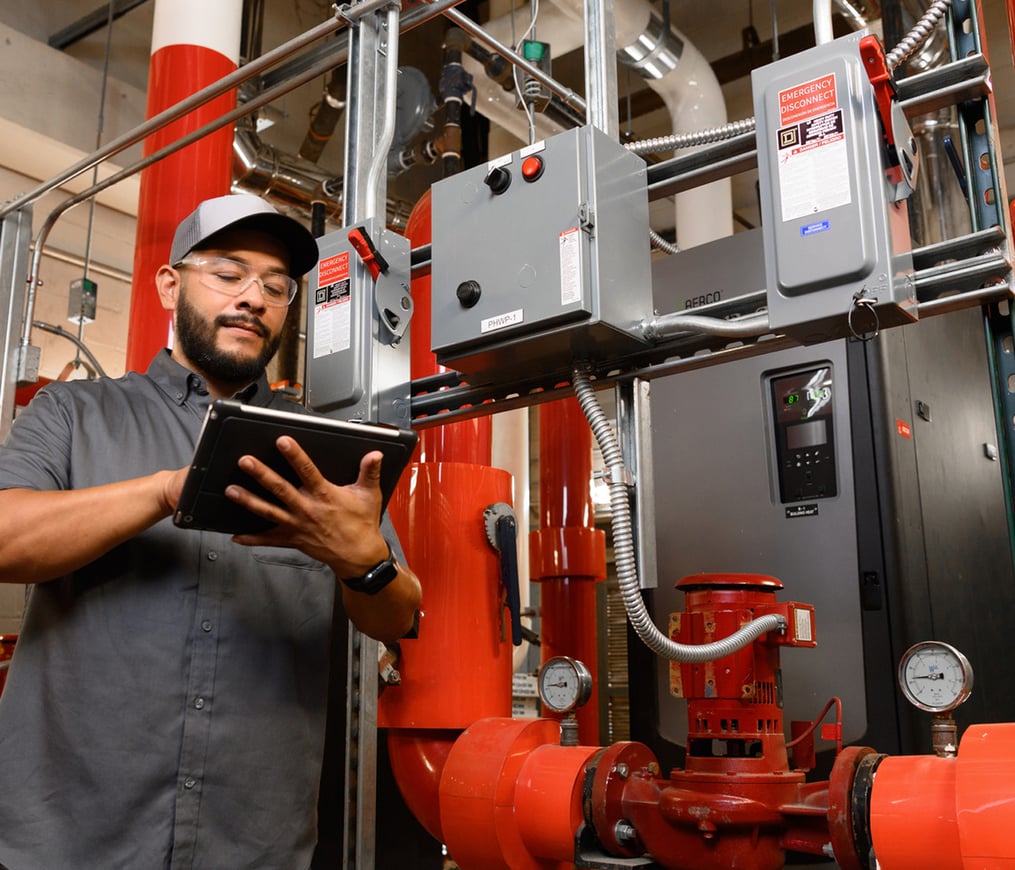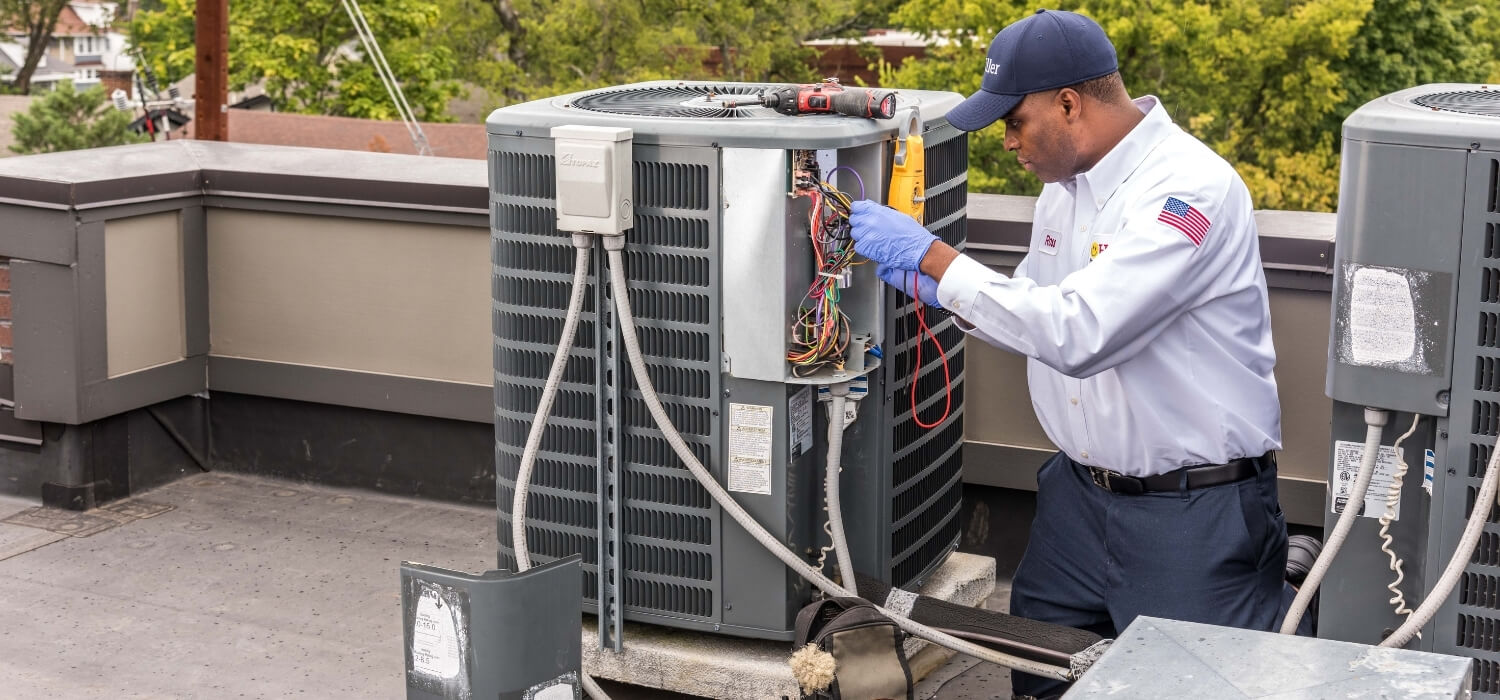HVAC Contractor for Reliable Heating & Cooling Solutions
HVAC Contractor for Reliable Heating & Cooling Solutions
Blog Article
An Extensive Check Out A/c Solutions and Their Effect On Energy Efficiency and Cost Savings
The role of a/c solutions in improving energy performance and attaining price savings is more critical than ever before, as property owners and services seek lasting services in an increasingly eco-conscious world. With technological advancements like wise thermostats and high-efficiency components, the potential for enhancing system efficiency is substantial. Yet, the true impact of these developments depends mostly on routine maintenance and proactive issue management. As we explore the elaborate connection in between heating and cooling systems and functional expenses, consisting of the change in the direction of eco-friendly alternatives, the concern emerges: how can these techniques be properly carried out to maximize both financial and eco-friendly benefits?

Significance of A/c Solutions
a/c systems are a vital part of modern-day buildings, playing a crucial role in maintaining comfy and healthy and balanced indoor settings. These systems, encompassing home heating, air flow, and air conditioning, are important for regulating temperature level, humidity, and air top quality, consequently making sure the wellness of residents. Reliable cooling and heating systems contribute considerably to producing an optimum indoor environment, which is vital for both household and industrial areas.
In commercial buildings, HVAC systems are essential to supplying a risk-free and effective environment. By controlling indoor climate problems, these systems assist prevent the growth of mold and the spread of air-borne impurities, hence protecting the health and wellness of employees and consumers. In addition, in household setups, a/c systems improve living conditions by offering regular thermal comfort and improving interior air top quality, which is vital for general health.
Furthermore, the style and upkeep of heating and cooling systems have a direct effect on power intake and functional costs. Appropriately made and maintained systems can significantly minimize power use, resulting in lowered utility costs and a smaller sized carbon footprint. The efficiency of these systems thus plays a critical role in promoting sustainability and power preservation within structures, highlighting their relevance in the modern architectural landscape.
Developments in Cooling And Heating Modern Technology
Development in cooling and heating technology is transforming the method structures take care of interior environments, ushering in a brand-new period of effectiveness and control. Current developments have actually concentrated on enhancing energy consumption while enhancing customer convenience. One significant advancement is the integration of smart thermostats, which utilize expert system to learn tenancy patterns and change temperatures as necessary, minimizing unnecessary energy usage.
Variable Refrigerant Flow (VRF) systems stand for one more considerable jump onward. These systems permit specific temperature level control in different zones of a building, boosting comfort and minimizing energy waste. VRF innovation is especially advantageous for huge industrial areas, offering flexibility and scalability.
Furthermore, the arrival of Internet of Things (IoT) devices has transformed heating and cooling systems into interconnected networks qualified of real-time information collection and analysis. This connectivity allows anticipating maintenance, making certain systems operate at peak effectiveness and lessening unexpected downtime.
Moreover, improvements in products and design, such as the usage of high-efficiency coils and compressors, have actually enhanced total system performance - Heating Contractor. The adoption of eco friendly refrigerants likewise emphasizes the industry's commitment to sustainability
These technical innovations are essential in reducing operational prices and ecological effect, establishing new criteria for developing environment administration.
Cooling And Heating Maintenance and Performance
Making sure optimum performance of a/c systems extends beyond technical innovations; it also depends upon effective upkeep practices. Routine maintenance is important for maintaining performance, reducing energy usage, and extending the life expectancy of HVAC systems. The primary goal is to guarantee that all elements operate at their peak potential, consequently minimizing energy waste and preserving constant indoor convenience degrees.
Regular maintenance tasks, such as cleaning or replacing air filters, checking refrigerant degrees, and examining ductwork for leaks, are necessary for preventing unnecessary stress on the system. Clogged or unclean filters can block air flow, triggering the system to work more difficult and consume even more power. Similarly, insufficient refrigerant levels can decrease cooling effectiveness, resulting in higher operational expenses.
Additionally, routine evaluations by qualified professionals can identify possible problems prior to they intensify right into pricey repair services or system failures. These evaluations usually include checking electric connections, calibrating thermostats, and making certain the general stability of the cooling and heating system. By resolving minor troubles early, organizations and house owners can avoid unexpected breakdowns and boost power effectiveness.
Affordable Cooling And Heating Solutions
For those wanting to obtain the most out of their home heating, air, and ventilation conditioning systems without damaging the financial institution, checking out cost-effective cooling and heating remedies can make a significant distinction. One immediate step is to purchase programmable thermostats, which enable users to establish certain temperatures for different times of the day, optimizing power use and reducing unneeded intake. By automating temperature modifications, property owners can accomplish significant savings on energy expenses.
Normal upkeep is one more essential element of affordable heating and cooling management. Making certain that filters are cleaned up or replaced routinely, ductwork is sealed, and devices are serviced by specialists can avoid costly repair work and improve system durability. Precautionary maintenance not only maintains system efficiency yet also aids in staying clear of unanticipated breakdowns that can cause expensive emergency repair work.
Furthermore, retrofitting existing systems with energy-efficient parts, such as variable rate motors or high-efficiency compressors, can be a prudent financial investment. These upgrades enhance operational efficiency, minimize energy use, and can commonly be executed at a portion of the expense of a complete system replacement.
Ecological Effect Reduction
Reducing the ecological impact of cooling and heating systems is important in today's pursuit of sustainable living. HVAC systems are considerable factors to energy intake, accounting for almost 40% of power usage in business buildings. This energy demand often relies upon nonrenewable fuel sources, causing greenhouse gas emissions and ecological destruction. Transitioning to much more reliable systems, such as those utilizing renewable resource resources, can considerably mitigate these influences.
Technological developments in a/c style check it out and procedure, consisting of the assimilation of clever thermostats and energy-efficient warm pumps, are essential in decreasing explanation carbon footprints. These advancements permit for optimized power usage, reducing wastage and boosting total system efficiency. Additionally, embracing routine maintenance methods makes sure cooling and heating systems run at peak effectiveness, additional reducing unnecessary power usage.
Additionally, making use of eco-friendly cooling agents is critical, as typical refrigerants, like CFCs and HCFCs, have been terminated because of their ozone-depleting buildings. Modern options, such as hydrofluoroolefins (HFOs), deal decreased environmental risks, aligning with international ecological protocols. By accepting these sustainable techniques, cooling and heating services can play a transformative role in decreasing ecological impacts, advertising energy performance, and promoting an extra sustainable future.
Conclusion

Moreover, the design and maintenance of click to investigate Heating and cooling systems have a straight impact on energy consumption and operational expenses. Regular upkeep is crucial for sustaining effectiveness, minimizing power intake, and expanding the life period of Heating and cooling systems. Heating and cooling systems are substantial contributors to energy usage, accounting for nearly 40% of energy use in business structures. In addition, taking on regular upkeep practices guarantees HVAC systems operate at peak effectiveness, further curtailing unnecessary power intake.
The change to eco pleasant Cooling and heating systems better lowers functional expenses and promotes sustainability. (Heating Contractor)
Report this page